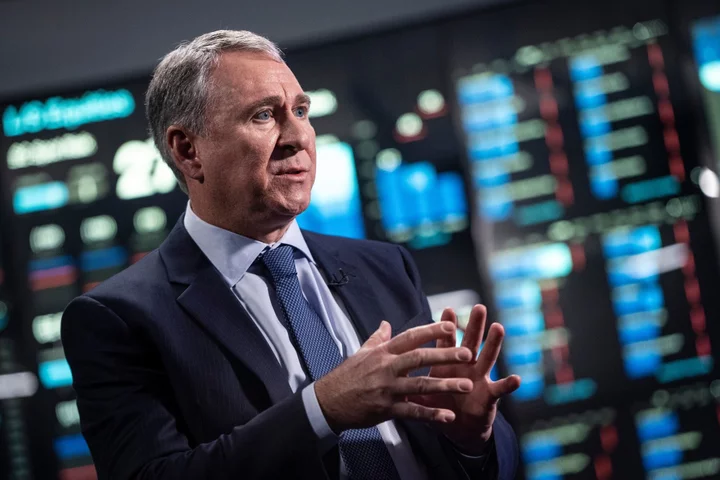In a hotel ballroom overlooking the South China Sea, 24-year-old Taylor sits with 13 other university students in hoodies and sneakers coding away on laptops during their school break.
The two jacked-up security guards sitting outside the hall signal this is no ordinary summer camp: The students flew business class from as far away as California and Singapore to spend several nights at the five-star Fullerton Ocean Park Hotel in Hong Kong. Trays of crab meat salad, mini croque monsieurs and skewers of prosciutto and melon sat nearby.
The highly sought-after interns were hand picked from 69,000 applicants by billionaire Ken Griffin’s lieutenants at Citadel and Citadel Securities LLC, as the finance giant looks to groom the next generation of math and computer whizzes that have helped it become one of the key components for market trading.
Over three days, the students will play the role of hedge fund traders, negotiating with counterparts, writing code, and devising automated strategies based on simulations with news feeds and macro data. It’s all part of a roughly 11-week program to prepare them for the often secretive world of trading and market-making, earning about $120 an hour along the way, or $19,200 a month.
“There’s only a finite pool of truly exceptional students,” said Kristina Martinez, Citadel’s managing director in charge of human resources in Asia-Pacific. “Because of the complexity of what we do and the fact that companies that intersect with us will be looking at the same people, we need to get in early.”
Griffin, 54, the world’s 33rd-richest person, knows a thing or two about student potential. He got his finance career started at Harvard University, trading convertible bonds from his dorm, asking janitors to set up a satellite dish on the roof so he could get live prices. He’s parlayed that to a personal fortune now worth about $37 billion.
His Citadel Securities has become a key part of the plumbing underlying the US stock market through its ability to execute $463 billion in trades a day — sometimes buying or selling shares themselves — acting as a counterparty and offering liquidity at the same time.
Math and coding are increasingly desired skillsets for staff at banks and investment firms around the world, but it’s particularly so at Griffin’s firms where quantitative researchers and engineers devise trading strategies and deploy algorithms to automate the process.
Read more: Ken Griffin’s Citadel Securities Feels the Heat of the Spotlight
The Hong Kong boot camp is one of many around the world for Miami-based Citadel, as Asia takes on a bigger focus given the company’s expansion in the region. Citadel, the hedge fund business, and Citadel Securities, the market maker, have doubled staff in Asia since 2020 to more than 400 people, even as some Wall Street firms pull back from the region.
During the summer program, the interns are each assigned a big project, as they work alongside the two firms’ army of staff who collectively generated $35.5 billion in revenue last year. A few select interns receive offers to come back within weeks after the program to take full-time jobs, while others rejoin part-time as early as their sophomore years.
“It was so different, none of my previous internships offered an off-site like this,” said Taylor, who asked to be identified only by her first name due to privacy concerns. “The projects that they asked us to work on were put to use in real applications, super challenging and exciting.”
As one of the fewer than 1% who made it to the internship this year, Taylor stood out given her prior stints at some of the largest tech companies including Meta Platforms Inc. A computer science major at the National University of Singapore, she moved to the city-state from Hebei, China when she was about 14 to attend high school after acing a test for gifted students.
Math Olympiad
Before joining Citadel, she had no financial industry knowledge, but had an avid interest in math, underscoring the type of talent that Citadel seeks. Almost without exception, the interns come from the most prestigious universities in their regions, some boasting math Olympiad Gold prizes or math doctorates from Stanford University in California. MBAs rarely make the cut.
One employee joked that Citadel was living proof of China’s old adage that “if you learn math, physics and chemistry well, you can conquer the world.”
Still, strong competency in those subjects is just a starting point, said Martinez.
“The person who’s just kind of awesome at academics, but has not done something above and beyond and not really demonstrated excitement around something, that’s probably not the candidate who’s going to thrive,” she said, in an interview in Hong Kong. “You’re assessing on potential” because “the problems that they face here, it’s not that we really know the answer either.”
Over the nearly three-month program, the students are evaluated on skills that go well beyond algebra. These include their level of curiosity and ability to take feedback and ask the right questions. They’re gauged on how well they collaborate with teammates, and how fast they adapt and pivot when new information is presented. It’s an intricate balance: they have to compete with each other and be a team player at the same time.
No Surprises
At the off-site, around lunch time, one student cheekily vows not to eat too much to avoid a mental dip before the rigorous trading simulation in the afternoon.
The students were split into groups, with each assigned a Citadel staffer to provide guidance but not answers. Over the next few hours, they were expected to create algorithms to hedge their risk and identify arbitrage opportunities, part of the training to help them understand the market-making process.
What they don’t know is that their behavior and interaction with each other is also part of the test.
“Unlike job interviews, the intern program is packed with real-time problem solving, social, learning and highly interactive activities,” said Martinez. “There are no surprises by the end of the process.”
Even meals are a test. One of the many markers for the students is their interaction with company leaders during networking dinners, which this year were held at the chic Madame Fu and Porterhouse restaurants in Hong Kong.
To be fair, the students aren’t flying blind. Citadel brings in professional trainers to groom them, with exercises that include writing an email to a boss by condensing a rambling, 163-word note down to fewer than 60 words.
Another involves videotaping themselves for a self-introduction, where they are taught to project their voice, match their facial expression to their message, and avoid the pitfalls of filler words and up-speak intonation. They’re also given personality tests and taught how to seek feedback by summarizing what other people say.
Talent Fight
The reason Citadel spares no resources to train these students is because of the intense battle for top-tier talent.
Griffin’s firms are competing with the likes of Meta, ByteDance Ltd. and Alphabet Inc. among technology giants, along with market-maker rivals including Optiver Holding BV, Jane Street Capital LLC and Susquehanna International Group.
For finance jobs across the US, median intern pay jumped 19% at 16 top firms studied by Levels.fyi, which analyzes compensation data submitted by users. At hedge funds and prop-trading firms, hourly pay surged 29% year-over-year to $111, with Citadel among the top of the pay list. Hedge funds and banks are also competing for talent against industries with fewer resources, including medical research that could benefit from AI and quant analysis skills.
Many finance interns get other benefits, including signing bonuses, living stipends and access to corporate housing, with pay packages similar to full-time employees. At top-tier Wall Street banks, five-star hotels, business-class flights and structured internships have become standard, said Tony Ernest, managing partner in Singapore for hedge fund talent consultancy Monroe Partners Asia.
“Gone are the days when interns did dog work,” he said, adding that if the internship goes well “it’s a great sales tool to get other students at the same schools interested.”
Campus recruiting now starts much earlier than before, and often lasts all year. Human resources departments are no longer just funneling stacks of resumes to hiring managers and doing one-off school visits.
“Never did hedge funds go to campus 10 years ago,” said Ernest. “Now they are soaking up the top 1% of graduates.”
Target Profs
Martinez and her team take a targeted approach, identifying professors at schools like Stanford and National University of Singapore that have a track record of grooming people who thrive at the company. They also unearth students through its Datathons, where participants work through large, complex datasets and present their findings.
First and second-year students can put themselves on the radar via Discover Citadel, where the top 40 to 50 applicants out of thousands are invited for a one or two-day event. The company also uses targeted recruiting and referrals to identify high-potential candidates, who are then invited to dinner sessions in cities including Hong Kong, New York and Singapore.
While Citadel and Citadel Securities don’t disclose their hiring rate, only “the truly outstanding” make the cut, Martinez says.
“Usually very early on in the internship you can identify the stars, the truly exceptional ones and this is when we tell the managers to go learn everything about who they are as individuals, who their parents are, who their brothers and sisters are, everything to secure their return,” she said.
Final Project
Back at her Citadel office desk in Singapore, Taylor is racing against time to wrap up her big project.
The tasks assigned to every intern are different — depending on whether they work on quantitative research, trading or operations — but they all involve actual problems facing the business. They’re expected to do a 15-minute presentation showcasing their work, and their solutions could be put to use.
For Taylor, who was asked to improve the efficiency of a specific program, her big takeaway was “to think bigger, not just focus on the issues in front of you, but more of the why and impact.”
As part of the off-site training, the students volunteered at a charity, packaging and delivering meals in Hong Kong. In true Citadel fashion, they were divided into groups, competing to be the fastest team.









